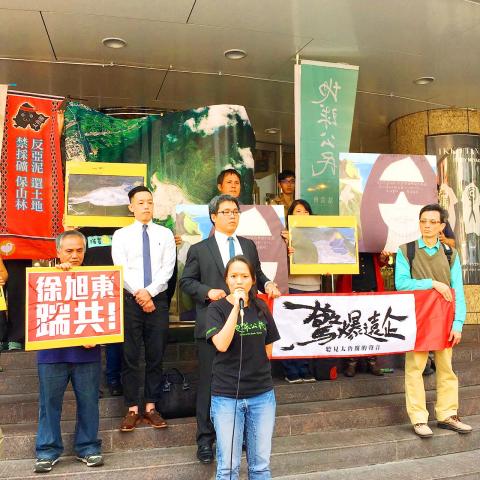Environmentalists and people living close to mining areas operated by Asia Cement Corp yesterday staged a flash mob event in front of the Far Eastern Plaza in Taipei to protest the Ministry of Economic Affairs’ “stealthy” extension of the corporation’s mining rights.
The extension would allow the company to continue marring the ecology and extend the ordeal Truku Aborigines face until 2037, protesters said.
The sound of explosions were played over loudspeakers, while smoke canisters were deployed to mimic a mining operation.

Photo: Yang Mien-chieh, Taipei Times
Police were at the scene to maintain order.
Asia Cement is a subsidiary of Far Eastern Group, which runs the Far Eastern Plaza.
“Taiwan is a democracy, but the Mining Act (礦業法) makes the nation look like a colony,” Citizen of the Earth, Taiwan member Pan Cheng-cheng (潘正正) said.
Environmentalists have sought for the act to be amended and have gained the backing of legislators across party lines, Pan said, adding that Democratic Progressive Party (DPP) Legislator Gao Jyh-peng (高志鵬), who chairs the legislature’s Economic Committee, this month said that the act is to be reviewed during this legislative session.
However, the ministry on the same day that Gao made the announcement extended Asia Cement’s mining rights in Hualien County’s Sincheng Township (新城) for 20 years, allowing the company to bypass an environmental impact assessment, she said.
Pan accused the ministry of safeguarding the company’s interests ahead of the proposed amendment.
The company has operated at the site for 60 years, despite it being a geologically sensitive zone that is prone to landslides, Pan said.
Cheng Wen-chuan (鄭文泉), a Truku whose home is near the mining site, said that vibrations from mining activity has caused his walls to crack and he has had to put up with thick dust.
Brandishing the deed to his property and a farming permit, Cheng said he had been unable to grow crops because his land had been cordoned off by Asia Cement workers.
Cheng urged the ministry to revoke its decision, saying he is disappointed at the swift approval of the company’s request for extended mining rights.
Article 21 of the Indigenous Peoples Basic Law (原住民基本法) stipulates that the government should consult Aborigines and gain their consent before carrying out developments in Aboriginal territory, but the ministry’s decision shows that it “treats the act like trash,” Cheng said.
President Tsai Ing-wen (蔡英文) in August last year after meeting with Tien Chun-chou (田春綢), who lives on land used by Asia Cement, instructed the Council of Indigenous Peoples to enforce the act when dealing with the firm’s application for an extension of its mining rights, Wild at Heart Legal Defense Association lawyer Hsieh Meng-yu (謝孟羽) said.
However, ministers without portfolio Lin Wan-yi (林萬億) and Chang Ching-sen (張景森) disobeyed Tsai’s order following negotiations, allowing the ministry to grant the company the extension, Hsieh said.
He urged people to call the Executive Yuan and the legislature to press agencies to abolish the “illegal” permission given to Asia Cement to continue mining.

Taiwan would welcome the return of Honduras as a diplomatic ally if its next president decides to make such a move, Minister of Foreign Affairs Lin Chia-lung (林佳龍) said yesterday. “Of course, we would welcome Honduras if they want to restore diplomatic ties with Taiwan after their elections,” Lin said at a meeting of the legislature’s Foreign Affairs and National Defense Committee, when asked to comment on statements made by two of the three Honduran presidential candidates during the presidential campaign in the Central American country. Taiwan is paying close attention to the region as a whole in the wake of a

President William Lai (賴清德) has appointed former vice president Chen Chien-jen (陳建仁) to attend the late Pope Francis’ funeral at the Vatican City on Saturday on his behalf, the Ministry of Foreign Affairs said today. The Holy See announced Francis’ funeral would take place on Saturday at 10am in St Peter’s Square. The ministry expressed condolences over Francis’ passing and said that Chen would represent Taiwan at the funeral and offer condolences in person. Taiwan and the Vatican have a long-standing and close diplomatic relationship, the ministry said. Both sides agreed to have Chen represent Taiwan at the funeral, given his Catholic identity and

Chinese Nationalist Party (KMT) Chairman Eric Chu (朱立倫), spokeswoman Yang Chih-yu (楊智伃) and Legislator Hsieh Lung-chieh (謝龍介) would be summoned by police for questioning for leading an illegal assembly on Thursday evening last week, Minister of the Interior Liu Shyh-fang (劉世芳) said today. The three KMT officials led an assembly outside the Taipei City Prosecutors’ Office, a restricted area where public assembly is not allowed, protesting the questioning of several KMT staff and searches of KMT headquarters and offices in a recall petition forgery case. Chu, Yang and Hsieh are all suspected of contravening the Assembly and Parade Act (集會遊行法) by holding

Lawmakers from the Democratic Progressive Party (DPP) yesterday established a friendship group with their counterparts in Ukraine to promote parliamentary exchanges between the two countries. A ceremony in Taipei for the Taiwan-Ukraine Parliamentary Friendship Association, initiated by DPP Legislator Chen Kuan-ting (陳冠廷), was attended by lawmakers and officials, including Deputy Minister of Foreign Affairs Francois Wu (吳志中) and European Economic and Trade Office in Taiwan Director Lutz Gullner. The increasingly dire situation in Ukraine is a global concern, and Taiwan cannot turn its back when the latter is in need of help, as the two countries share many common values and interests,